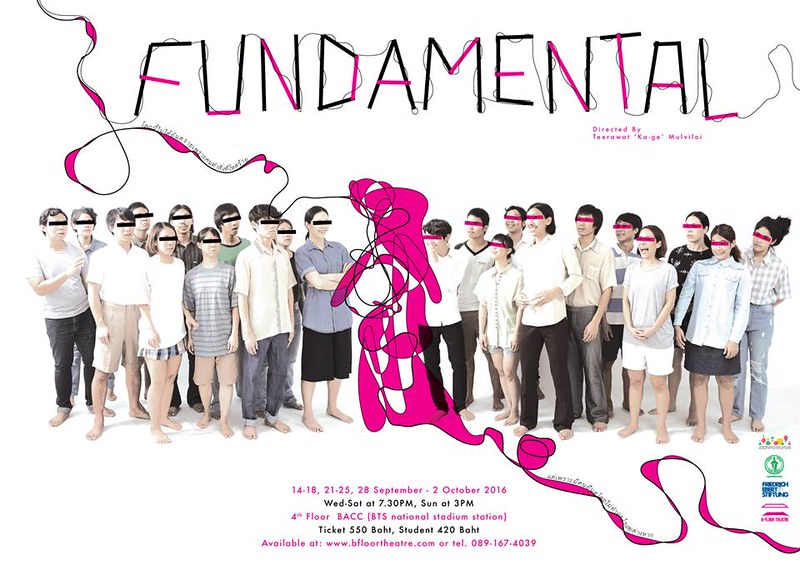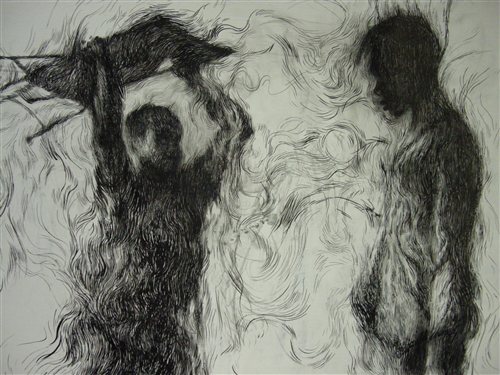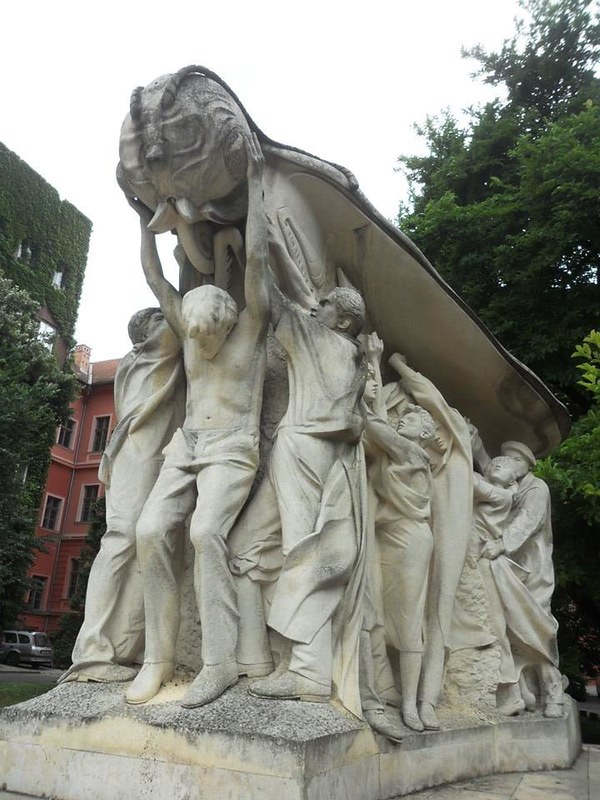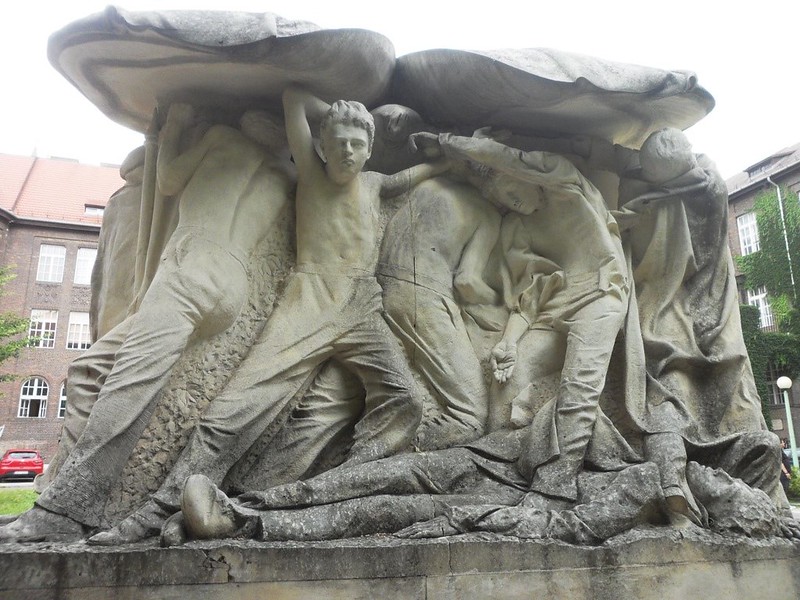[SOS – Save/Slaughter Our Students]

Photo from Fundamental's Facebook Page
How does one discuss the undiscussed and undiscussable past?
How does one represent the unrepresented and unrepresentable present?
How does one imagine the unimagined and unimaginable future?
Answer: One may probably choose [or is left with no choice but] to communicate in codes.
The acute ability to doublespeak and speak double or triple or quadruple innuendoes without breathing and articulating the exact word -- such is the fundamental service which a totalitarian regime renders to the oppressed mass. Such is its badge of honour, such is our intellectual game. For a scholar and lecturer of Modernist literature like myself, today’s Thailand is considered a first-class discourse analysis gym – an excellent arena for students to spar and fence their critical & analytical skills. Had he lived in Bangkok in 2016, T.S. Eliot would have rewritten and renamed The Waste Land to The Waste Land of Smiles, in which he would have revelled in many more objects or figures which could be “correlated” with the bleak future and futility of humankind: the silencing of the impotent fisher king, the demise of the fortune teller, and the real unreal city of unreal smiles of happiness re(-)turned. Similarly, Franz Kafka would have revised The Trial in ways that the Josef K. whom most of us know – the man who wakes up one day to find intruders in his flat not only stealing his breakfast but also having the audacity to announce that he has been charged for unknown and unknowable crime – a mere character from a children’s book. Kafka would have relished (or relinquished) the ample instances of unspeakable crimes and trials behind closed doors which the waste land of smiles offers. Today’s Thailand is a philosophical utopia where theories are still consigned to the realm of the living present—a paradise for experimental writers.
Sadly, however, we cannot deny that de-coding and re-coding taboos among ourselves is also the scarlet letter of deprived freedom – the cross of shame we need to bear. Yes, I will come to that (in)visible chair you’re waiting for – that painful albatross which we Thais – either knowingly or unknowingly –wrap around our necks like silk scarves of ignorance or amethyst amulets of despair. OR NOT.

Photo from A artist daily
Countless articles, artwork and photo exhibitions have addressed THE chair just as countless articles, artwork and photo exhibitions have addressed Yorick’s skull in Shakespeare’s Hamlet. So I do not feel like contributing to the existing stream of representable representation of violence.
I will instead try to address the (ex-)stream of unrepresentable unrepresented
· · · — — — · · ·
One may say the only nine-element signal of ……… Alright, you said it yourself: EXT.R-E-M.ISM.
Witnessing [for there is no other suitable word to describe this experience at BACC] Teerawat Mulvilai’s FUNDAMENTAL a dance performance, a re-enactment which is also a de-enactment, which aims to commemorate the 40th anniversary of “Oct 6” incident – I feel that how “Oct 6” has become an insulting and outrageous nomenclature in Thai history which, nevertheless, has never been recounted in Thai history books is the kind of absurdity which would put Sisyphus or even Camus to shame. For 40 years the reality of Thammasat University massacre which took place in October 1976 has been evaded, hijacked and glossed over by (in)visible hands.
I could not help but wonder to what extent my non-Thai friends who join me tonight understand the symbolism taking place before them – the fish market scene where bodies of students are bartered and bargained by shouting vendors of Buddhist zeal echoes the (in)famous statement made by a prominent monk (whose name has rarely been mentioned in schools) that killing a communist – meaning student protester (communist or not is beside the point) – is not a sin. The fish imagery works well within the framework of the merit-making-by-releasing-fish-and-eels norm and the Thai saying of ฆ่าคนเหมือนผักปลา [to slaughter human beings in great number like they’re “vegetables or fish”] a slippery phrase which always manages to wiggle free from the rigid net of translation. The label “communist”, like “Trotskyite” or “Titoist” (note the irony within irony), has been used against undesirables and deviants who dared to swim against the currents of conformity like a perverted Salmon. Nothing hurts like a confluence of reformist minds and loyalist hearts whose fervent wishes and best intention only expose the insecurity of dominant political discourse and reigning regime.
I also could not help but wonder to what extent the giggling younger people behind me grasp the scene in which the performers’ movements reflect what happened to Chit Phumisak, the student activist at the Faculty of Arts, Chulalongkorn University. Chit was thrown off the stage, well, also centre stage (literally!) located in Chulalongkorn University auditorium for criticising the regime of his time. Daring to do “[w]hat Napoleon achieved by the sword” by wielding his pen as weapon, Chit’s subsequent punishment surpassed that which befell Napoleon – enough to make that French man thank his stars he wasn’t born a Thai in 1953, when this happened. Would those who are still singing or could recall having sung the Thai popular sexist [“snake wife”] and racist [“Zulu”] hazing ritual songs realise by now that the cruel act of throwing and bullying an individual who happens to think differently goes hand in hand with the frat or seniority system, as well as the useless cheerleading drills, pomp and circumstance which many still adore and uphold?
But these questions of mine are superficial – not to mention condescending to the extreme. The focus of FUNDAMENTAL is not de-coding “Oct 6” and discriminate against those who cannot de-code or understand the innuendoes and symbolisms. That’s the extremist trajectory. Going down that fundamentalist route will only defeat the performance’s fundamental purpose. True, reading and de-coding history in the making we see on the BACC platform is undoubtedly an important part of the project. But being Derridean enough to deconstruct codes and say the SOS signalled by the performers can mean both “save our students” and “slaughter our students” is nothing but simplistic.
The strength of FUNDAMENTAL is fundamentally this: Re-coding. The haunting eyes on the ghosts of the massacre on stage – the ghosts of “violation past” who were stripped and beaten – stare into our souls as if asking how far we have come and how much they have been betrayed. The acts of cleaning and purging the streets of blood and evidence of crime against humanity are not the things in the past. The same can be said for the blowing of whistles. We re-code history and project the spectre and phantasmagoria of our vague interpretation of the past as a layer of the wasteland of the present and future. This transcends not only time and space, but also cultures and languages -- so much so that a dear friend from the Czech Republic who is sitting beside me is reminded of a similar incident which took place in Prague. After the performance, this friend decided to look information up and learn more about Thailand in 1976 in order to help deconstruct the empty nomenclature that was “Oct 6”. Such is, in my opinion, FUNDAMENTAL’s greatest success. The defiant spirit of the outwardly “communist” Chit Phumisak greets the spirit of Jan Palach, a Czech student who committed self-immolation as a political protest against the 1968 invasion of Czechoslovakia by the Warsaw Pact armies. Different though their labels and ideologies are, they inter-mix [to adapt from Virginia Woolf’s famous words: “Different though the sexes are, they inter-mix”].
As someone who is also interested in the history, arts, culture and literature of Central and Eastern Europe, I am very much reminded of a monument in the university town of Szeged, Hungary, which I have just visited a couple of months ago. Commemorating the 40th anniversary of the 1956 Hungarian Revolution, this monument (pictured below) is indeed bizarre. Upon one google search click one finds out that students from Szeged were actively involved in the Hungarian Revolution. But what is it they are upholding (or sheltering under) – is it a butterfly of freedom or a moth of elusive and fragile signification? It must be a butterfly who dreams it is a moth or a moth who dreams it is a butterfly. But what does this symbolise?
How does one discuss the undiscussed and undiscussable past?
How does one represent the unrepresented and unrepresentable present?
How does one imagine the unimagined and unimaginable future?


Photos from Verita Sriratana
Answer:
A boy, surely a student, defiantly stares at the spectator.
As if he’s saying that it doesn’t matter.
As if he’s asking with his eyes – in unison with the raped, murdered and mutilated Thai students who defiantly stare through the eyes of the living performers –
So when you're near me, darling,
can't you hear me
· · · — — — · · ·?
About the author: Verita Sriratana, PhD, is a lecturer at the Faculty of Arts, Chulalongkorn University ([email protected])

